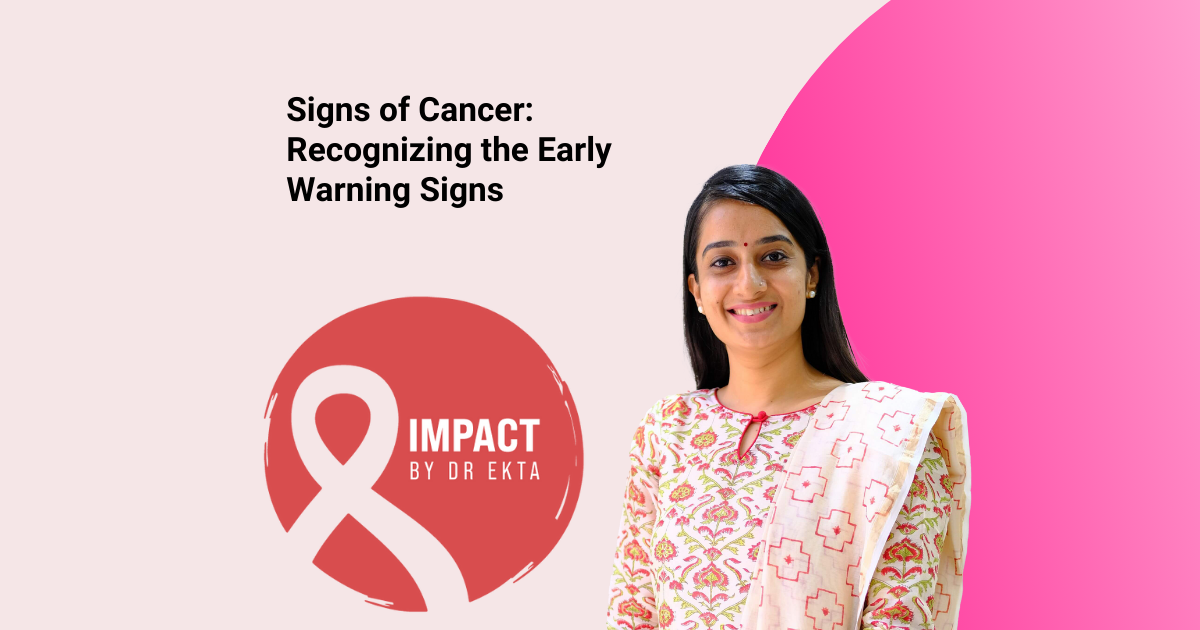As an oncologist, I often find myself guiding patients through the puzzles of symptoms that might suggest cancer. One of the most challenging aspects of my job is helping people understand the early signs of cancer. Recognizing these signs early can be crucial for timely diagnosis and treatment, potentially improving outcomes significantly. In this blog, I’ll share my insights on the various signs of cancer and how to stay vigilant.
Understanding Cancer and Its Early Warning Signs
Cancer is not just one disease but a group of related diseases that can affect any part of the body. It starts when cells begin to grow uncontrollably and form tumors or affect other tissues. The early signs of cancer can vary greatly depending on the type of cancer and where it is located. However, some symptoms might be indicative of a more serious issue and warrant further investigation.
Common Early Signs of Cancer
- Unexplained Weight Loss One of the early warning signs of cancer that I often discuss with my patients is unexplained weight loss. If you notice a significant drop in weight without any change in diet or exercise, it could be a sign of cancer. Many types of cancer, including pancreatic, stomach, and lung cancer, can cause rapid weight loss due to the body’s increased energy demands or changes in metabolism.
- Persistent Fatigue Feeling unusually tired or fatigued is another sign of cancer that shouldn’t be ignored. While fatigue is a common symptom and can result from many conditions, persistent and severe fatigue that doesn’t improve with rest could be indicative of cancer. This symptom is often seen in leukemia and other cancers.
- Unexplained Pain Pain that doesn’t seem to have a clear cause or persists despite treatment could be one of the signs of cancer. For instance, bone pain might be a sign of leukemia or other cancers that have spread to the bones. Persistent headaches or back pain could also be related to tumors or cancer-related issues.
- Skin Changes Changes in the skin, such as new moles or changes in existing ones, can be signs of skin cancer. Any changes in color, shape, or size of a mole or other skin lesion should be evaluated. Similarly, non-healing sores or ulcers can also be early signs of cancer.
- Changes in Bowel or Bladder Habits Significant changes in bowel or bladder habits, such as persistent diarrhea, constipation, blood in the stool, or unusual urine patterns, can be signs of cancer. For example, colorectal cancer often presents with changes in bowel habits, while bladder cancer might cause blood in the urine.
- Persistent Cough or Hoarseness A cough that doesn’t go away or hoarseness in the voice can be signs of cancer, particularly lung cancer or cancers of the throat and larynx. If you have a persistent cough or your voice changes without a clear cause, it’s important to seek medical advice.
- Unusual Bleeding or Discharge Any unusual bleeding or discharge from any part of the body should be investigated. This includes blood in the urine, unexplained vaginal bleeding, or abnormal discharge from the nipples. These symptoms can be indicative of cancers such as bladder cancer, cervical cancer, or breast cancer.
- Lumps or Swelling The presence of lumps or swelling, particularly if they are new or have changed in size, can be one of the signs of cancer. Breast lumps are often associated with breast cancer, while lumps in the neck, armpits, or groin can indicate lymphoma or other types of cancer.
- Difficulty Swallowing Difficulty swallowing or a persistent feeling of something being stuck in your throat can be early signs of cancer, particularly esophageal or throat cancer. If this symptom is persistent and worsening, it should be evaluated by a healthcare professional.
- Changes in Appetite A sudden change in appetite, such as a loss of appetite or a feeling of fullness after eating only a small amount of food, can sometimes be a sign of cancer. This symptom is often associated with cancers affecting the digestive system, including stomach and ovarian cancers.
When to Seek Medical Advice
It’s important to remember that many of these symptoms can be caused by conditions other than cancer. However, if you experience any of these signs of cancer persistently or if they are severe, it’s crucial to consult a healthcare professional. Early detection is key, and timely intervention can make a significant difference in treatment outcomes.
The Role of Screening and Regular Check-Ups
In addition to being aware of the signs of cancer, regular screening and check-ups can play a vital role in early detection. Depending on your age, family history, and risk factors, your doctor may recommend specific screenings, such as mammograms, colonoscopies, or Pap smears. These screenings can often detect cancer before symptoms appear, allowing for earlier and potentially more effective treatment.
Conclusion
Recognizing the early signs of cancer is a critical part of ensuring prompt diagnosis and treatment. While many symptoms can be related to conditions other than cancer, paying attention to persistent or unusual changes in your health is important. If you notice any of the signs of cancer discussed in this blog, don’t hesitate to seek medical advice.
As an oncologist, I am here to help guide you through this process and provide support at every step. Early detection can lead to better outcomes, and taking action as soon as possible is the best way to ensure the best possible outcome for your health.

